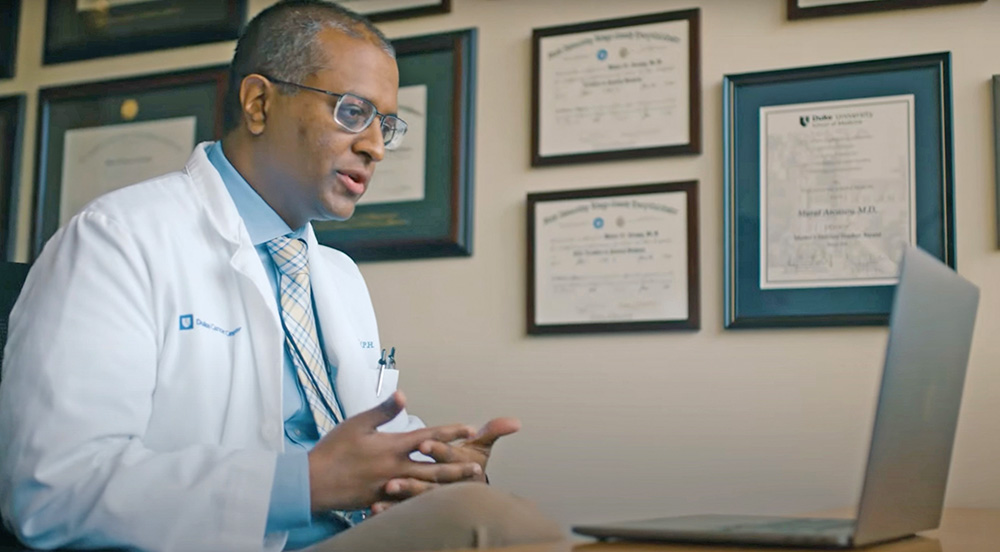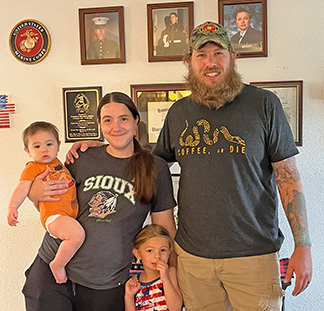When Marine Corps Veteran Stephen Miller was diagnosed with cancer, his search for top-notch health care led him to choose VA.
Here is Miller’s remarkable story and the exceptional care he received as a Veteran undergoing cancer treatment at VA. Through sharing his experience, he hopes other Veterans consider VA for their health care needs.
Serving his country and battling cancer
Miller, from Grand Forks, North Dakota, served in the Marine Corps from 2005 to 2009, including a 2008 deployment to Iraq. He received his initial cancer diagnosis of classical seminoma, a category of testicular cancer, at Tucson VA in 2017. Although the prescribed treatment had a 90% success rate, his case was more complex than anticipated. Despite undergoing high-dose chemotherapy in 2018 that appeared fully successful, he later learned the cancer was merely lying dormant.
Five years later in 2022, routine follow-up scans revealed swollen lymph nodes that were still within the normal range but warranted observation. After careful monitoring by his VA provider over the course of six months, his care team noticed that his lymph nodes had grown significantly larger, triggering another round of cancer treatments.
Choosing VA for cancer care
Miller weighed the advantages of using his VA health care benefits against other renowned health care institutions. He chose Fargo for several reasons. Proximity played a role as Fargo VA was conveniently located near his home and he was impressed by the quality of care provided. Fargo VA’s impeccable hospital cleanliness and the evident compassion of its nurses also convinced him that this was the best care available in the area.
“You’re going to have great days and then you’re going to have really bad days when you’re doing chemo. The nurses, they really understood and they’re patient,” said Miller. “They’re passionate and they really care.”
The importance of early screening
Miller felt a strong sense of support from his VA physician Dr. Pradeep Poonnen (pictured above). Though this round of treatment was much more challenging, Poonnen’s expertise and unwavering commitment to Miller’s well-being made a significant difference in his treatment journey. After being on active treatment for 18 weeks and responding well, Miller’s scans are now clear and he continues today with routine surveillance.
Miller’s cancer was detected at an earlier stage for his type of testicular cancer. Further metastasis was prevented through VA’s routine surveillance programs and diligent screening. Through early detection and follow-up monitoring, potential issues were promptly addressed helping lead to a positive treatment outcome.
Miller urges his fellow Veterans “to prioritize regular screening and check-ups,” as early detection significantly improves treatment outcomes.
Compassionate nurses and convenient telemedicine
The nursing staff at Fargo VA left an indelible impression on Miller. Their exceptional care, compassion and unwavering support were instrumental in his treatment journey. From managing side effects to addressing concerns, the nurses went above and beyond to ensure his comfort and well-being.
Additionally, VA’s telemedicine capabilities were a game-changer. Living an hour away from his local VA, Miller could easily participate in follow-up appointments and receive remote consultations when necessary, saving valuable time and energy that would have otherwise been spent on commuting.
The power of family and effective communication
Miller also emphasizes “when one family member is diagnosed with cancer, your whole family gets diagnosed with cancer.”
His family’s unwavering support and involvement made a significant difference in his ability to cope with the challenges of fighting cancer. This was made easier by his care team’s family approach to treatment, ensuring open lines of communication and providing invaluable assistance in managing even the smallest of side effects.
Miller’s journey as a Veteran receiving cancer care at VA is an example of what personalized attention, compassionate care and a commitment to early detection can do to help improve the chances of successful cancer treatment. From routine screenings to state-of-the-art treatments, VA stands shoulder-to-shoulder with Veterans ready to provide the comprehensive care that they deserve and have earned.
Learn more about cancer care and VA
Veterans are strongly encouraged to talk to their VA provider about the need for different cancer screenings and what screening options are available.
To learn more about cancer care at VA, visit cancer.va.gov.
Visit My HealtheVet to learn tips and tools to help you partner with your health care team, so together you may work to manage your health.
Topics in this story
More Stories
Bob Jesse Award celebrates the achievements of a VA employee and a team or department that exemplifies innovative practices within VA.
The Medical Foster Home program offers Veterans an alternative to nursing homes.
Watch the Under Secretary for Health and a panel of experts discuss VA Health Connect tele-emergency care.








i salute you!
My experience being diagnosed and initial treatment for multiple myeloma the San Diego VA was not as positive. Once referred to oncologist my treatment greatly improved but by that time I had lost all confidence with my primary doctor ability and care.
Also why does the VA not offer a support group for cancer patients. Most of us got the cancer during service and talking to other veterans about the grief, self blame, and anxiety of it all would be beneficial. I think the VA really has room for improvement when it comes to cancer care overall.